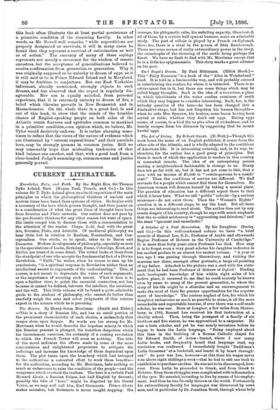CURRENT LITERATURE.
Knowledge, Duty, and Faith. By the Right Hon. Sir Thomas Dyke Acland, Bart. (Kegan Paul, Trench, and Co.)—In this volume Sir T. Dyke Acland gives us a lucid exposition of the main principles on which the philosophical thinkers of ancient and modern times have based their systems of ethics. He begins with a summary of the laws which govern thought, and then passes on to a consideration of what the great lines of thought have been from Socrates and Plato onwards. Our author does not pass by the pre-Socratic thinkers for any other reason but want of space. His limits compel him to dismiss them with a commendation to the attention of the reader. Chaps. ii.-iii. deal with the great trio, Socrates, Plato, and Aristotle. Of media3val philosophy we hear little but in relation to Realism, Nominalism, and Con- ceptualism. One stride, so to speak, takes us to Bacon and Descartes. Modern developments of philosophy, especially as seen in the speculations of Locke, Berkeley, Hume, Coleridge, Kant, and Butler, are treated in some detail. The writer looks at them from the standpoint of one who accepts the fundamental fact of a Divine Revelation. "Faith," he writes, when he comes to sum up his conclusions, "is a spiritual response to Revelation rather than an intellectual assent to arguments of the understanding." This, of course, is not meant to depreciate the value of such arguments, or the importance of securing such assent. What it does is to open a further view, to point the essential connection, not less because it cannot be defined, between the intellect, the emotions, and the will. This little volume will be found a quite admirable guide to the student of philosophy, who cannot do better than carefully weigh the sane and sober judgments of this veteran expert in the science which he is pursuing.


































 Previous page
Previous page